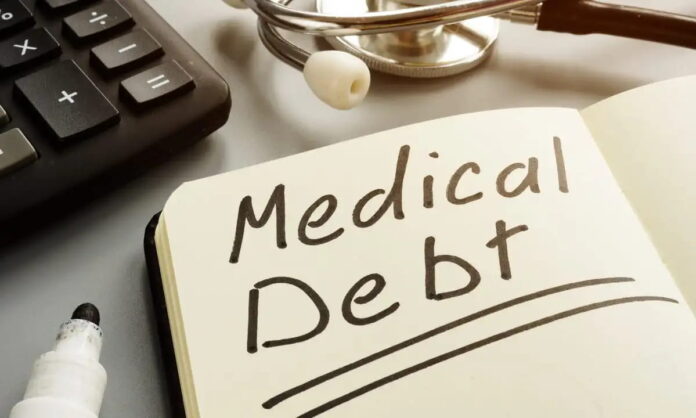Medical debt is one of the most significant contributors to financial stress in the United States. With rising healthcare costs, unexpected medical emergencies, and inadequate insurance coverage, millions of Americans find themselves burdened by medical bills that ripple through their overall financial stability. This article explores why medical debt often leads to financial stress in other areas and how tools like prescription discount cards, such as those provided by BuzzRx, can offer some relief.
The Overwhelming Impact of Medical Debt
Medical debt isn’t just about the cost of care—it’s about its consequences. When individuals and families struggle to pay medical bills, the financial stress they experience often extends beyond healthcare. In fact, over 100 million adults in the U.S. currently have healthcare debt, according to recent studies, and this debt can impact everything from housing to savings and creditworthiness.
Here are a few key reasons why medical debt leads to increased financial stress in other areas:
1. Depletion of Savings
Medical expenses are often unexpected, and most households lack sufficient savings to cover significant medical bills. This leads many people to dip into their emergency funds—or even their retirement savings—to pay off medical debt. Unfortunately, this leaves individuals with little to no financial safety net, making them more vulnerable to other financial emergencies like car repairs, job loss, or unexpected home expenses.
2. Rising Credit Card Debt
When people can’t pay medical bills outright, they often turn to credit cards. While this may seem like a quick fix, it comes at a high cost. Credit cards typically have high-interest rates, which can cause the debt to grow quickly and become unmanageable. This creates a cycle where paying off one debt leads to the accumulation of another, adding to financial stress.
3. Damaged Credit Scores
Unpaid or late medical bills can have a devastating impact on credit scores. Medical debt that gets sent to collections is reflected on credit reports, reducing individuals’ ability to secure loans or mortgages. A lower credit score can also result in higher interest rates, making borrowing more expensive in the future.
4. Housing and Utility Struggles
Medical debt often forces families to make difficult choices. With limited income, they may prioritize paying their medical bills over rent or utility payments. This can lead to housing insecurity, utility shutoffs, or even eviction. A 2022 survey found that 60% of Americans with medical debt have skipped paying essential bills in order to manage their healthcare costs.
5. Mental and Emotional Stress
Beyond financial consequences, medical debt takes a significant toll on mental health. The constant worry of how to pay bills can lead to anxiety, depression, and even physical health problems. This stress can reduce productivity at work, leading to decreased income and perpetuating financial difficulties.
The Role of Prescription Costs in Medical Debt
One major driver of medical debt is the high cost of prescription medications. Many individuals find themselves unable to afford the medications they need to manage chronic conditions or recover from illnesses. This leads to either racking up debt or skipping medications altogether, which can worsen health outcomes and result in even higher medical expenses down the road.
Prescription Discount Cards: A Simple Solution to Reduce Costs
One way to reduce the financial burden of prescription medications is by using prescription discount cards. These cards help individuals save money on their medications, even if they don’t have insurance or their insurance doesn’t cover the full cost.
BuzzRX is one such prescription discount card provider making a significant impact. With BuzzRX, users can save up to 80% on their prescription medications at major pharmacies across the United States. The card is free to use, requires no personal information or credit checks, and can be used by anyone—insured or uninsured.
By using tools like BuzzRX, individuals can cut down their out-of-pocket medication costs, reducing the likelihood of accumulating medical debt. Over time, these savings can help lessen the financial strain and allow families to allocate their income toward other essential expenses.
Breaking the Cycle of Medical Debt
While solutions like prescription discount cards offer some relief, addressing medical debt’s broader impact requires systemic change. In the meantime, individuals can take proactive steps to manage their medical expenses and reduce financial stress:
- Communicate with Healthcare Providers: Many hospitals and clinics offer payment plans or financial assistance programs. Negotiating a payment plan can make it easier to manage bills without sacrificing other financial priorities.
- Research Prescription Discounts: As mentioned, prescription discount cards like BuzzRX can make medications significantly more affordable.
- Prioritize Building an Emergency Fund: Setting aside even small amounts of money can help create a safety net to cover unexpected costs.
- Educate Yourself on Insurance Options: Understanding your health insurance coverage and exploring supplemental insurance options can help mitigate costs.
Conclusion
Medical debt is more than just a healthcare issue—it’s a financial crisis that affects millions of Americans. The stress of managing unpaid medical bills often seeps into other aspects of life, impacting savings, credit, housing, and mental health. While systemic changes are necessary to address the root causes of medical debt, individuals can take advantage of resources like prescription discount cards to reduce immediate costs.
Tools like BuzzRX are invaluable in this fight, helping individuals save money on essential medications and break the cycle of debt. By taking proactive steps and utilizing available resources, individuals can regain control of their finances and reduce the broader impacts of medical debt.
Did you find this helpful? Check out our other helpful articles on our website.
Read Also
- The Future of Men’s Health: Why Telehealth Is Here to StayTelehealth isn’t just a pandemic trend that faded into the background. For Australian men, it has become one of the most practical, time-saving, and stress-free ways to manage everyday health — and it’s shaping the future of how we access care. Platforms like DOCTO, an Australian online doctor and specialist telehealth service, are leading the… Read more: The Future of Men’s Health: Why Telehealth Is Here to Stay
- How to Build a Simple, Clean Skincare Routine ?You don’t need a complicated skincare routine. It doesn’t have to be something that requires twenty different products and confusing steps. Your routine works well with just a few high-quality clean ingredients. The beauty industry keeps pushing more products, but your skin actually needs less. You only need a simple approach to get better results… Read more: How to Build a Simple, Clean Skincare Routine ?
- How Preventive Dental Care Supports Overall HealthHave you ever wondered how a simple dental checkup could impact your entire body? Oral health is more than just a bright smile. Studies show that poor dental habits can contribute to serious health problems. Gum disease and tooth decay are linked to heart disease, diabetes, and infections. Yet, many people overlook preventive dental care.… Read more: How Preventive Dental Care Supports Overall Health
- Seeing Clearly in a High-Tech World: A Deep Dive into Advanced Vision Care ServicesProtecting your eyesight isn’t optional—it’s essential. Modern eye care has evolved far beyond basic exams, offering advanced diagnostics, personalized treatments, and surgical innovations that keep vision sharp for life. A leading example is Intermountain Eye Center, home to specialists like Dr Fishburn Boise, where patients receive comprehensive, high-level vision care designed to preserve long-term eye… Read more: Seeing Clearly in a High-Tech World: A Deep Dive into Advanced Vision Care Services
- Why the Keto Diet Works for Some People—and Fails Dramatically for Others: An Ayurvedic Breakdown for Modern HealthcareThe keto diet has dominated weight-loss culture for years. For some people, it produces rapid fat loss, stable energy, and improved mental clarity. For others—especially those who gain weight easily—it leads to burnout, digestive distress, rebound weight gain, high cholesterol, and a metabolism that feels slower than before. Healthcare often frames this as a discipline… Read more: Why the Keto Diet Works for Some People—and Fails Dramatically for Others: An Ayurvedic Breakdown for Modern Healthcare
- How to Choose the Best Assisted Living Facility for SeniorsAre you looking for the right assisted living facility for a senior loved one? Choosing a place can feel overwhelming. There are many factors to consider, from care services to the environment. Safety, comfort, and social opportunities play important roles in daily life. Each senior has unique needs and preferences that must be met. Understanding… Read more: How to Choose the Best Assisted Living Facility for Seniors
- Burn Smart, Not Hard; Shape Burn: Clean Protein for Weight ManagementYou want to feel light, strong, and confident. You don’t want crash diets or fake promises. You need a plan that works with your body, not against it. That’s where Shape Burn comes in. You can burn fat without losing strength. You can eat better and stay full. You can manage weight in a way… Read more: Burn Smart, Not Hard; Shape Burn: Clean Protein for Weight Management
- Creatine Basics: How Much Is 5g, How Much Water You Need, and Whether Pills or Powder Work BetterIf you’ve ever walked into a supplement aisle or scrolled through fitness TikTok, you’ve probably seen people talking about creatine — usually with a shaker bottle in hand and promises of better workouts and faster gains. And honestly? They’re not wrong. Creatine is one of the most researched and effective supplements for muscle strength, recovery,… Read more: Creatine Basics: How Much Is 5g, How Much Water You Need, and Whether Pills or Powder Work Better









